- Home
- neetha Napew
The Web Page 17
The Web Read online
Page 17
the stairwell as he started up, tired still, his muscles aching.
"B complex," he murmured. If he could reach his bike, he could give
himself an injection. Another injection. "Shit," he murmured.
He reached the top of the stairs, the library empty through the open door,
a light under a green shade glowing from the glass-partitioned office.
He lurched toward it, knocking over a large dictionary stand. He glanced
back at it, then stood up straight, catching his breath. He reached the
glass partition, then turned the knob of her office door. There was a
small closet at the back, behind her desk.
As he opened the door, he started to feel his strength returning. Inside,
neatly folded on the top shelf, were his clothes. He looked below. On the
floor were his boots. No guns.
He turned to the desk, opening the large side drawer on the left-hand
pedestal bottom.
The double Alessi shoulder rig, the twin Detonics stainless ,s. His A.G.
Russell Sting IA knife.
He took up the shoulder rig, snapping one of the pistols out of the
holster, then checked it—the chamber was still
loaded, five rounds still in the magazine. He looked up; Martha Bogen was
coming toward him.
He pointed the gun at her face. She stopped, then dropped to her knees on
the floor and began to cry. "I didn't want to die alone."
"Nobody'll have to die; I won't let it happen."
"You can't stop. it. You'll die, loo. But we'll both die alone."
Rourke heard a tiny explosion, then a whistling sound. He glanced at his
Rolex, still running in the drawer; then he pulled open the curtain over
the window to the street. Against the darkness, he could see a skyrocket
bursting. It was exquisite.
" told you." He heard Martha Bogen s voice shout hysterically. "I told
you so, John!"
The fireworks. Rourke remembered her saying they would come just before
the explosions, just before the end.
The pickup truck had thrown a part from the engine— she wasn't sure
what—and the radiator had burst and the pickup had stopped dead.
For the last three miles, as she judged it, she and the children had
walked hugging the side of the farm road— &he had been too tired to cross
country. With her, she carried the stolen M- rifle, her husband's
.—the gun now covered with a light layer of brown that she considered
to be rust—and among her few personal effects the photographs she had
taken from the farmhouse on the Night of the War. Her wedding picture with
John was among them.
She sat staring at it now, folded, creased, cracked. He wore a tuxedo and
she a floor-length white gown and a veil. The children were resting. It
was not far to theMul-liner farm now, but they had needed to rest. She
felt as though she were entering a new stage of her life, and somehow
staring at the wedding photo had seemed necessary before going to the
farm.
She put it away, seeing the picture more clearly in her mind than in the
photograph. She remembered their wedding night, John's body next to hers—
"Mamma?"
She turned and looked at Michael in the predawn gray-ness. "Yes, son?"
"Will Daddy find us here—at Mary's?"
"I think so—if anyone can find anyone, Daddy will find us. Come here,
Annie." Annie came beside her and Sarah hugged both children to her body.
She heard the barking of a dog, released the children, and grabbed for the
rifle. But the dog stopped on the rise of ground, a golden retriever—the
one her children had run with, played with. The dog ran up to them.
Michael, and then Annie—always a little more afraid of dogs-hugged the
animal, and were in turn licked in the face,
Sarah stood up, slinging the rifle across her back—shf could rest now, at
least until John found them. "Until/ she repeated aloud.
Natalia placed her hands on her waist, just above the Safariland holsters
carrying the twin Smith & Wesson revolvers. She looked at Paul Rubenstein,
saying, "I don't see anything, Paul."
"When John brought me up here the first time, he told me that was the
whole idea." Rubenstein smiled in the gray predawn. "I can't really
explain it as he does—but I guess he did a lot of research. He said it was
the way Egyptian tombs were sealed, and things like that. He wanted the
place tamper-proof. Watch this." Rubenstein approached a large boulder on
his right. He pushed against it, and the boulder rolled away.
He walked to his left, pushing a similar but not identical boulder. It
was more squared off. As Rubenstein pushed, the rock on which Natalia
stood beside him began to drop down. As the rock beneath them dropped, a
slab of rock—she compared it to a garage door—opened inward.
"John told me it's just a system of weights and counterbalances,"
Rubenstein told her. "Maybe you understand it better—didn't you have some
training as an engineer?'
"Nothing like this," she said, feeling literally amazed.
Rubenstein shined a flashlight—she remembered it as one of the angleheads
he and John had said they'd taken from the geological supply house in
Albuquerque just after the Night of the War. In the shaft of yellow light,
she could see Paul bending over, flicking a switch. The interior beyond
the moved-aside slab of rock was bathed in red light now. "All ready for
Christmas." Rubenstein laughed. "Red light? That was a joke."
"Yes, Paul," Natalia murmured.
"HI get the bike. Hold this." He handed her the flashlight.
She studied the rock, murmuring, "Granite," as she heard the sounds of
Rubenstein's Harley Low Rider being brought inside.
"Now watch this," Rubenstein said, suddenly beside her.
"Yes, Paul." She nodded, giving him back the flashlight. He moved over
beside a light switch, then shifted a red-handled lever downward, locking
it under a notch. He left the small cave for an instant and she could both
hear and see him rolling the rock counterbalances back in place outside.
Rubenstein returned to the red-handled lever, loosed it from the notch
that had retained it, and raised il. The granite slab—the door—started
shifting back into place, blocking the entrance.
"What are those steel doors for?" Natalia asked, | gesturing
beyond the pale of red light.
"The entrance inside." Rubenstein moved toward the doors, then began
working a combination dial, then another, all in the shaft of yellow light
from the anglehead. "John installed ultrasonic equipment to keep insects
and critters out—"
"And closed-circuit television," Natalia added, looking up toward the
vaulted rock above her.
"Can you find that switch for the red light back there?" Rubenstein asked
her.
"Yes, Paul," she nodded, in the dim light found the switch, then worked it
off. There was near total darkness now. "Paul?"
"Right here—wait." She heard the sounds of the steel doors opening.
She stepped closer to the beam of the anglehead flashlight, staring into
the darkness beyond it.
"Ya ready?" she heard Paul's voice ask.
"I don't know
. . . for—" She heard the sound of a light switch clicking.
She closed her eyes against the light a moment, then opened them.
"I don't believe it." She heard her voice; she couldn't remember it having
ever sounded quite so astonished to her.
"That's the Great Room." She looked at Paul, watched the pride and
happiness in his face.
"Great—yes," she repeated.
She started to walk, down the three low steps in front of her, a ramp to
her left, her eyes riveted on the waterfall and the pool it made at the
far end of the cavern; then she drifted to the couch, the tables, the
chairs, the video recording equipment, the books that lined the walls, the
weapons cabinet.
And on the end table beside the sofa . . . She stopped, approaching the
couch, picking up the picture frame there.
"Would you like a drink, Natalia?" Rubenstein's voice came to her from
across the Great Room. "I can show the
rest to you after a while,"
"What? A drink—yes," she called back.
The little boy in the photo—he was a miniature twin of John Rourke.
"Michael," Natalia murmured, feeling herself smile. So fine, so beautiful,
so strong. And the little girl—the face of an imp, a smile that— Natalia
felt herself smiling more broadly.
And John, his arm around a woman who looked abou! Natalia's age, perhaps
older by a few years. She was pretty, with dark hair and green eyes, or so
it seemed in the picture.
"Sarah Rourke," Natalia murmured.
'That's them," Rubenstein said, suddenly beside her. "I didn't ask what
you wanted. Figured Seagram's Seven would be all—"
"Perfect. That's perfect, Paul."
"That's Sarah and Michael and Annie. I feel almost as though I know them."
Rubenstein laughed.
"Yes, Paul—so do I," Natalia said, putting the picture down on the end
table. "So do I." She stopped talking then, because she felt she was going
to cry and didn'! want to.
Rozhdestvenskiy looked at the Army major, Ivan Borozeni. "Major—it is
immaterial to me if the population is unarmed essentially."
"But, Colonel, I see little need for going in firing— we—"
"Major, I will remind you of your rank—and also of one salient point you
may not have considered. The Morris Industries plant was a highly secret
Defense Department installation and manufacturing facility. If it still
stands, it would seem obvious that the civilian government of the town is
aware of its strategic importance to one degree or another. Hence, if we
do not put down any thought of resistance as we enter the valley, they
will likely use demolitions to destroy the plant.'
"But, Comrade Colonel—"
Rozhdestvenskiy dragged heavily on his cigarette. "Your objections shall
be noted in my official report. Now—lead your men into the assault."
The Army major stiffened visibly, then saluted, Rozhdestvenskiy, still
dressed in civilian clothes, nodding only.
Rozhdestvenskiy turned and started back toward his command helicopter. In
the far distance, he had been seeing fireworks illuminating the dawn sky.
Peculiar, he had thought, surprised that Major Borozeni hadn't mentioned
it. ...
Below him now, he could see the helicopter gunships shadows hovering like
huge black wasps over the lip of the dish-shaped mountain valley, and
beyond the rirn, the first of Borozeni's attack forces were moving up. It
was like a gigantic board game, he thought—this thing of being a field
commander. He rather liked it.
Rozhdestvenskiy spoke into the small microphone in front of his lips.
"This is Colonel Nehemiah Rozhdestvenskiy; the attack has begun!"
His jaw tightened, his neck tensed, and he nodded to his pilot, watching
the man's hands as he worked the controls, feeling the emotion already in
the pit of his stomach. They were starting down.
The mists on the ground rolled under the downdrafts of the helicopter
rotors—he watched them swir! beneath the long shadow of his machine as
they came from the sun. Surprise—there would be surprise, he thought.
Already, he could see the factory looming ahead and below them, the only
large industrial building in the town, at its far edge.
"Down there," he rasped into his headset microphone. "There—get us down
there." Then he switched channels, into the all-bands monitoring system so
both Borozeni's ground commanders and the pilots of the other helicopter
gunships could hear him. "This is Rozhdestvenskiy—we will converge on the
factory due west of the town. Only KGB personnel will be allowed
inside the factory complex itself, and only those with a clearance level
over CX Seven will be allowed within the factory. Crush any resistance."
He glanced through the bubble in front of him as another skyrocket soared
up, exploding, as if the fools—he thought—were celebrating the attack.
Into the microphone again, he snapped, "And find the source of those
fireworks; I want them stopped!"
As he judged it, the factory was less than a mile away now so again he
spoke into the microphone, but on the aerial-force band only. "This is
Rozhdestvenskiy. Commando squad ready! Pilots take up positions!"
His own ship was hanging back as a half-dozen helicopter gunships, their
cargo doors open, formed themselves into a crude circle around the
factory fence, perhaps one hundred feet in the air.
Rozhdestvenskiy saw the first of the ropes being let down; then suddenly,
like dozens of spiders sliding on filaments of web, dark-clad forms
started down the ropes, rappelling toward the ground. "Good man!" he
rasped, unconscious that he had spoken into the microphone.
The first of the men were on the ground, establishing a perimeter, their
assault rifles and light machine guns ready.
The last of the commando team was down. "Move out, commando force ships,"
he barked into the microphone. "Take up positions two hundred yards from
and around the factory fences."
Rozhdestvenskiy turned to his own pilot, tapping the man on the arm, then
jerking his thumb downward.
The pilot nodded, then started the machine ahead and down.
Rozhdestvenskiy's mouth was dry, his palms sweating.
He snapped up the collar of his windbreaker, checking
I
the AKM across his lap.
He had never been in mass combat before.
The helicopter gunship was hovering, then dropping, gliding forward
slightly and stopping.
He felt the lurch, felt the impact; then he released the restraint
harness, throwing open the side door and stepping out near a squad of the
commandos already on the ground, his own personal KGB team surrounding
him.
"We enter the factory. Follow me!" He started to run, remembering as he
ran to raise the rifle into an assault position.
The gates of the factory complex were locked with a chain, a massive
padlock securing them.
"Stand back." He raised the assault rifle, firing into the lock. The sound
of the jacketed slugs tearing into the metal of the lock was deafening,
but the lock seemed to have been br
oken.
He reached for it, feeling the heat of the metal despite the gloves he
wore, wrenching it open, then twisting it free of the chain.
"Get the gates opened—now!"
The chain-link twelve-foot gates swung inward, and Rozhdestvenbkiy stepped
into the service drive of Morris Industries—a giant step, he felt, in
history.
He started to run, shouting again, "Follow me!" Above him, there was a
spectacular burst, a skyrocket of blue and red and gold in a starburst,
massive, exquisite.
He continued running, reaching a set of double doors. They would be
locked. He raised the assault rifle again, firing into the locking
mechanism. A burglar alarm sounded.
"Idiots," he shouted, then reached the doors, twisting
on the outside handle, wrenching the door open outward. He stepped into
the factory complex, his men surrounding him. The building was in reality
a series of interconnecting buildings.
"The loading docks," he shouted, then started running. It the materials he
sought would he anywhere, they would be by the loading docks. There would
be time then to search out precisely where they were manufactured. Gray
light shafted through wire mesh-reinforced glass windowpanes as he ran the
length of the first building; and occasionally through one of the windows
as he looked out, he could see fireworks in the sky—more rockets, more
starbursts. Were the people here insane?
He reached the end of a long corridor, already breathless from the
running. Glancing to right and then to left, he looked right again.
"There—hurry." For some reason, some reason he couldn't understand, he
felt the need to hurry that much greater each time one of the skyrockets
would explode. He felt—he couldn't define it.
Ahead of him he saw massive garage doors of corrugated metal, and between
the doors and the corridor through which he ran, he could see
crates—coffin-shaped and roughly the same size. He stopped running,
leaning heavily against the wall, his breath coming in short gasps.

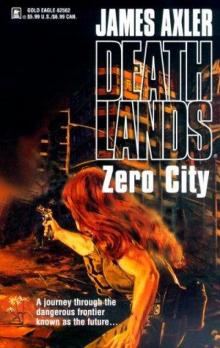 Zero City
Zero City Freedom Omnibus
Freedom Omnibus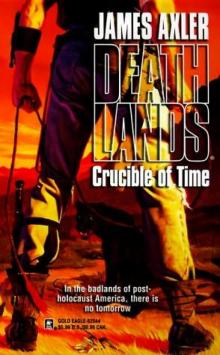 ACrucible of Time
ACrucible of Time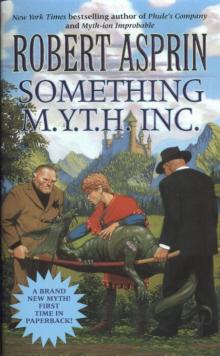 Something MYTH Inc
Something MYTH Inc Forbidden Land
Forbidden Land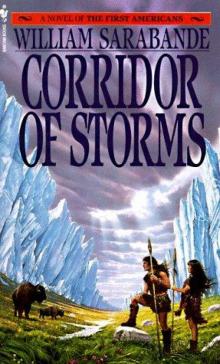 Corridor of Storms
Corridor of Storms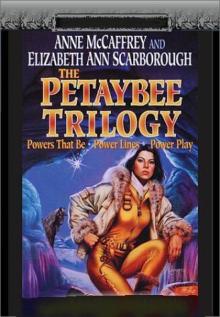 The Peytabee Omnibus
The Peytabee Omnibus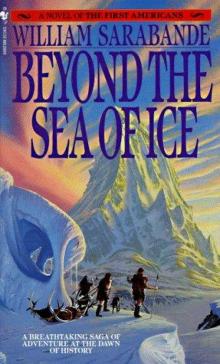 Beyond the Sea of Ice
Beyond the Sea of Ice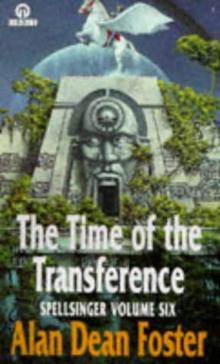 The Time Of The Transferance
The Time Of The Transferance EarthBlood
EarthBlood The Lexal Affair
The Lexal Affair The Web
The Web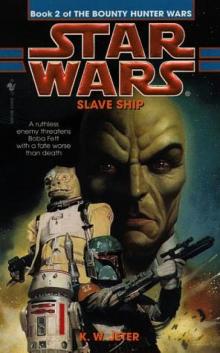 Slave Ship
Slave Ship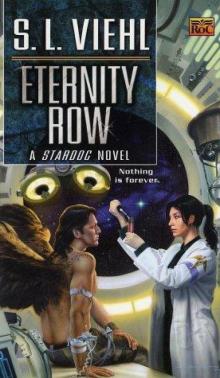 Eternity Row
Eternity Row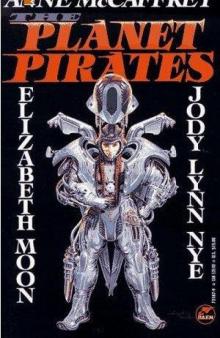 Planet Pirates Omnibus
Planet Pirates Omnibus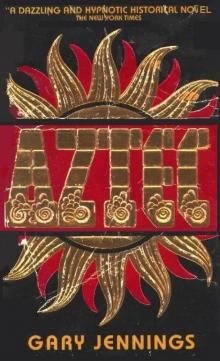 Aztec
Aztec The Awakening
The Awakening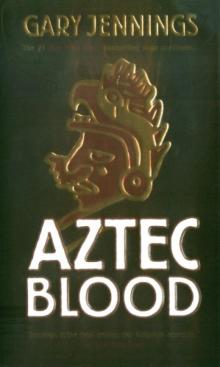 Aztec Blood
Aztec Blood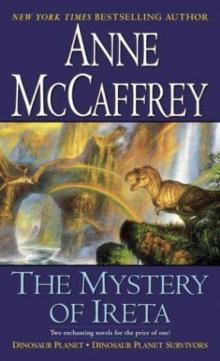 The Mystery of Ireta Omnibus
The Mystery of Ireta Omnibus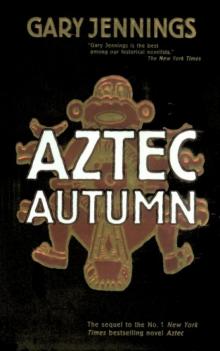 Aztec Autumn
Aztec Autumn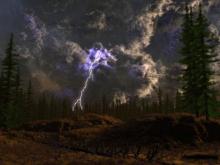 The Savage Horde
The Savage Horde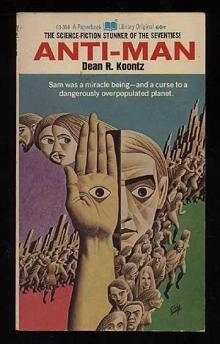 Anti - Man
Anti - Man Deep Trek
Deep Trek Starfall
Starfall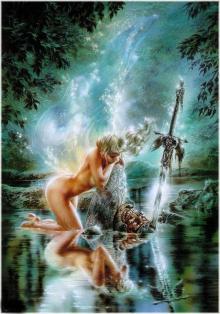 The Paths Of The Perambulator
The Paths Of The Perambulator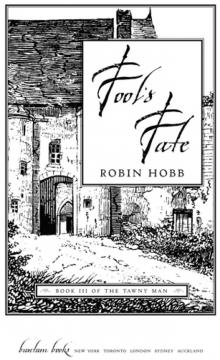 Fool's Fate
Fool's Fate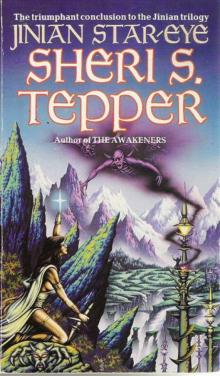 Jinian Stareye
Jinian Stareye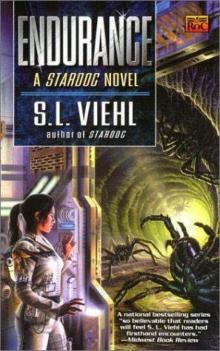 Endurance
Endurance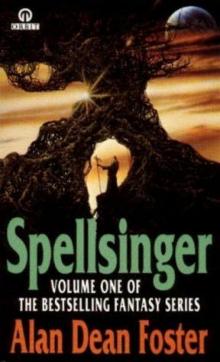 Spellsinger
Spellsinger Hybrids
Hybrids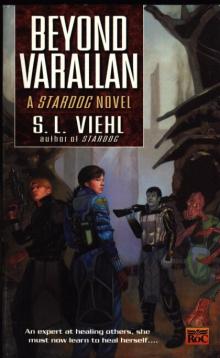 Beyond Varallan
Beyond Varallan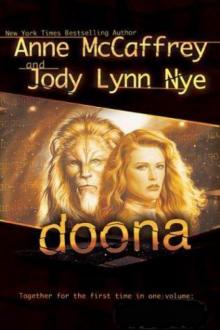 Doona Trilogy Omnibus
Doona Trilogy Omnibus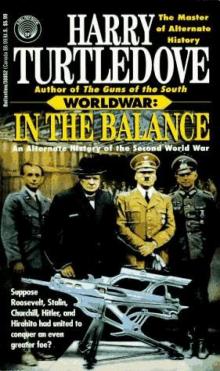 In th Balance
In th Balance Planerbound
Planerbound The Nightmare begins
The Nightmare begins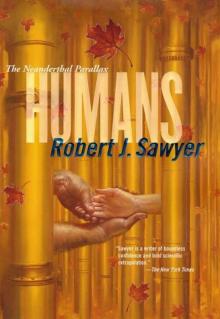 Humans
Humans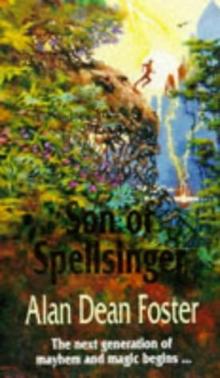 Son Of Spellsinger
Son Of Spellsinger